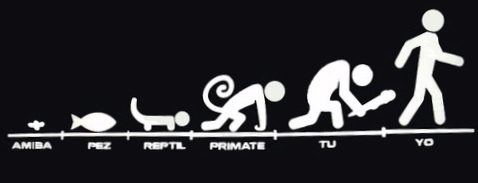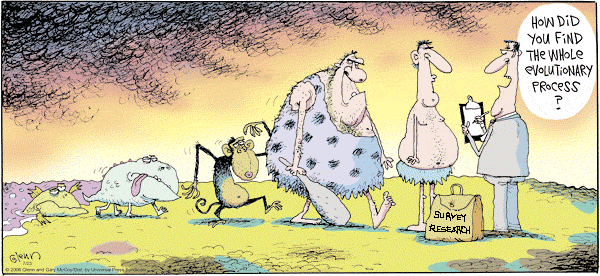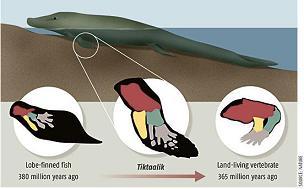
This post represents something of a departure from the usual themes of this blog, since it does not deal directly with questions of economic behavior, money or markets. However, it does address “big picture” issues in scientific inquiry, which affect all realms of sociological research. Specifically, the post builds on an analogy drawn by Wolfgang Streeck in his new book, Re-Forming Capitalism: Institutional Change in the German Political Economy (Oxford 2009). His account of epistemology in social science, and its resemblance to the advance of knowledge within evolutionary theory, struck me–to my surprise–as a particularly compelling way to frame the contribution of qualitative research to sociology. The devaluation of qualitative sociology as “unscientific” and of dubious value compared to quantitative research has always struck me as ill-considered; Streeck’s work provided a way to articulate a response that went right to the heart of the debate.
Early in the book, Streeck raises “the possibility of the theory of biological evolution…serving as a model for social history” (p. 11). It’s an extraordinarily fruitful idea, with wide-ranging implications. The pursuit of knowledge through data sources such as archival research, content analysis and participant observation turns out to have a surprising amount in common with evolutionary theory. Yet qualitative research faces ongoing threats to its legitimacy, even within sociology. The fallacies of these legitimacy challenges will be the subject of this post, drawing on and extending Streeck’s analogy between sociology and research on evolution.
The works of Marx and Weber, like virtually all the classic literature in the field, were based on qualitative, historical methodology (Durkheim’s quantitative study Suicide being a notable exception). As Streeck puts it,
Classical social science examined how the modern way of life had evolved out of the past…and the evolution of the emerging political-economic institutions of capitalist society.
(p. 11, emphasis in original)
Even outside the realm of these classic studies, qualitative research in sociology inevitably contains an element of the historical. In order to explain how things are, what social actors think they are doing, and what it means to them, qualitative research necessarily delves into the past, uncovering path-dependencies in structures and actions. In this way, it shares the basic perspective of evolutionary theory: privileging explanation over prediction. Yet no one questions the position of evolutionary theory as part of the broader scientific endeavor. Even creationist publications that reject evolution as “Satanic” acknowledge its status as a science by attacking its purported failures to be sufficiently scientific—for example, by claiming that “evolution is just a theory” or that “The primary scientific evidence is a pitifully small array of bones.”
In contrast, sociology occupies a far more tenuous position, often treated as a pseudo-science or a “wannabe” science particularly when it comes to qualitative work. As of 2006, 95 percent of Americans agreed that biology—of which evolutionary theory is a part—was a science, but only about half that many (49 percent) thought sociology was; a full 8 percent said they’d never heard of sociology in the first place! Making matters worse, sociologists themselves disagree as to whether their discipline is a science. Qualitative sociology has been at the center of these attacks—often devalued as “mere description,” making it indistinguishable (in the eyes of some) from non-scientific endeavors like history and journalism. These legitimacy challenges to the status of qualitative research as part of the scientific endeavor has been growing since the “quantitative revolution”—the rise of computer-assisted calculation—swept through sociology starting in the 1950s.

Streeck’s observations about the surprising commonalties between sociology and evolutionary theory got me thinking about the liminal status of qualitative sociology. Given the many resemblances between it and evolutionary theory, the questions about the scientific status of the former seem even more ill-founded than usual. Of the many observations one could make in this connection, I was especially struck by two things:
- On Prediction and Hypothesis-Testing
Like qualitative sociology, evolutionary theory has been subject to widespread misunderstanding about its ability to make predictions. While evolutionary theory can’t predict exactly how animals and plants will evolve, it can make predictions that guide future research, as the cases of Tiktaalik roseae and the naked mole-rat illustrate. It does this by looking backward, explaining how things came to be, then using that method to construct and validate models that can be extrapolated into the future. Sometimes, this process results in highly specific predictions—like those surrounding changes in the appearance of the Peppered Moth in Great Britain during recent decades—other times in more generalized conjectures, such as warnings about the possibility of a “mass extinction event” if global biodiversity continues to decline at its present rate.These methods of advancing knowledge have close parallels in qualitative sociology. For example, the ability of qualitative sociology to generate theory inductively, through means such as grounded theory development, is fairly well-accepted. This process includes the formulation of causal models and hypotheses, which means that qualitative research can create testable (and falsifiable) predictions—an essential characteristic in the definition of science.

However, the rigor of theory testing is often thought to be beyond the scope of qualitative research—an assumption that persists despite a multitude of peer-reviewed, published studies demonstrating the contrary.
- Accounting for Historicity and Change
Another important commonality between evolutionary theory and qualitative sociology is their direct engagement with historical change. Evolution is first and foremost about processes of transformation in the natural world, and qualitative sociology excels at this kind of explanation in the social realm, particularly when it comes to addressing phenomena such as the effects of repeated interactions on groups and institutions. Both domains of research recognize that there is an irreducible element of stochastic change—that is, unpredictability—over time within any complex system. And while their temporal scales are certainly different—evolution deals with change over thousands of years, while sociology rarely looks at more than a century’s worth of data—they share the basic viewpoint that history matters and that one purpose of inquiry is to explain how.
While some notable sociologists—such as Mark Granovetter, whose undergraduate degree is in history—have pointed out that sociological research can and should acknowledge the impact of “embeddedness,” regardless of the research methods employed, much of discipline has fallen into “temporal reductionism”—“treating relations and structures of relations as if they had no history.” [1] This is particularly strange, because as Streeck points out in his new book, explaining historical change was one of the core objectives of the emerging social sciences in the 19th century. Yet paradoxically, in its quest to become more “scientific” in the 20th century and beyond, the discipline modeled itself on “nineteenth-century mechanics,” resulting in the “search by much of current social science for historically universal, invariant principles governing social organization” (p. 12).Streeck does not elaborate here on the methodological consequences of this selection, but a definition of “science” as the discovery of mechanistic laws that transcend time and space would seem to exclude virtually anything but quantitative research. At the same time, this (mis)understanding of science devalues qualitative inquiry, making many sociologists “afraid of being accused of ‘atheoretical storytelling’” (p. 12). Thus sociology finds itself in the peculiar position of seeming to delegitimate its own origins.
Among the most regrettable consequences of this is the limitations it imposes on what sociology can achieve: that is, the kinds of questions it can address, and the kinds of answers it can offer. In the latter case, as Streeck points out, we are confronted with many instances of “ahistorical theory-building” (p. 12), whose explanatory power leaves much to be desired. Perhaps even more troubling, the devaluing of qualitative research has the perverse effect (for a discipline that purportedly seeks “universals”) of reducing sociology’s ability to engage with the big-picture questions of the social world—like “how did capitalism arise where and when it did?”Because evolution can address big-picture questions without having to defend its status as a science, it has made a good deal of progress on issues like the origins of life on Earth. The downside of trying to do big-picture science is that it leads into the messy terrain of complex systems: ones that combine elements of randomness with strong patterns of historicity. Acknowledging these forces is a strength of evolutionary theory, as well as of qualitative forms of sociological research—good reasons to embrace the latter as part of the social scientific endeavor.
While Streeck’s point about the links between sociological theory and evolution was incidental to his larger aims in the new book, he contributes an important insight on the puzzling status of qualitative research in contemporary sociology. The computing revolution, along with the long-standing popular view of sociology as mere common sense—a misconception that remains surprisingly robust, despite having been tackled by Max Weber nearly a century ago—have all contributed to the problem. Sociology’s ill-fated efforts to achieve scientific legitimacy by modeling itself on the physical sciences have been noted by others; but Streeck does something entirely new, suggesting that the problem is not that sociology is unscientific, but that sociologists have been modeling their work on the wrong kind of science—and an outmoded type at that!
His simple observation suggests something rather radical: instead of trying (and failing) to be like 19th century physics, sociology would play to its own strengths and contribute more to knowledge by building on its commonalties with evolutionary theory. One way to start this paradigm shift, as I see it, is to start by recognizing the scientific value of qualitative research, based on its ability to address complex, big-picture questions, and to offer explanations that account for conflict and change—things we often miss by privileging quantitative sociology.

This year gives us occasion to celebrate two important events:
* the 200th anniversary of Darwin’s birth (12 February 1809)
* the 150th anniversary of the publication of On the Origin of Species (24 November 1859)
Happy Birthday to both!
Comments 5
The evolution of qualitative sociology « Design Research — May 8, 2009
[...] of qualitative sociology May 8, 2009 The blog Economic Sociology has a great post on the “evolution” of qualitative sociology. They note, quite rightly, that the notion of “evolution” is implicit in much of social [...]
Jon Smajda — May 10, 2009
I think much of this has to do with sociologists---and more qualitative and culturally-oriented sociologists in particular---being so averse to evolutionary thinking with respect to human social behavior. Of course, humans are just a small speck of what evolutionary biology is about, but sociologists seem to have such a caricatured view of evolution out of reaction against sociobiology, evolutionary psych, etc. that they just don't seem very willing to learn much about the field as a whole. Which is a shame, because, as you say, I think there's a lot to learn there. Also, for whatever reason, evolution biology has some of the most eloquent spokespeople out there & there's just some great reading available for those interested in an overview.
Théorie de l’évolution et sciences sociales qualitatives « Rationalité Limitée — May 22, 2009
[...] de la sélection de groupe en matière d’évolution économique et sociale, on peut lire ce très intéressant billet sur un blog de sociologie économique que je viens de découvrir. L’auteur fait une [...]
cookiecrumbles — June 8, 2009
Gregory Bateson 1904-1980) spent his life working out such orders of connection and levels of problem with great aplumb. The implications range well past sociology or qualitative sociology. Would be interesting to examine the conenctions between Streeck and Bateson and if the former is aware of the latter.
Luis Enrique — June 10, 2009
There are quite a few articles wich address the possible convergence between the social sciences and the biological sciences:
BARKING UP THE WRONG BRANCH: Scientific Alternatives to the Current Model of Sociological Science from Lieberson and Lynn. Annual Review of Sociology 2002.
Taking evolution seriously from Steinmo and Lewis (work in progress)
Transforming socio-economics with a new epistemology from Hollingsworth and Muller, and the debate with Boyer et al. Socio-economic review.
There are more things, but these are the ones I remeber right now. I hope they are useful.